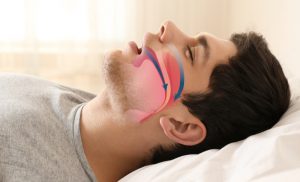Many people have had to share a home with someone who snores. An estimated 40 percent of men and 24 percent of women snore, much to the chagrin of the people around them. Every night, the grating noise fills the air, making it difficult for other members of the household to get much-needed slumber.
However, snoring is not a problem merely because of the noise. It is often a sign of obstructive sleep apnea, a disorder in which people stop breathing for short periods of time while asleep. Both snoring and sleep apnea are known to contribute to heart disease and other serious heart problems. According to a new study on how snoring can cause heart disease, women may be especially prone to these health effects.
How Snoring Can Cause Heart Disease

Although this short time without oxygen is not enough to cause health problems on its own, people with this disease will stop breathing hundreds of times every night. This creates high levels of stress hormones that can raise blood pressure and damage blood vessels. With sleep apnea, there is also often cumulative damage to organs that are routinely starved of oxygen.
The heart appears to be especially prone to this damage. This is likely due to several factors. Coronary arteries are some of the smallest in the body, which makes them prone to damage from hypertension. In addition, even a small amount of oxygen deficit can gradually do irreparable damage to the cardiac muscle cells that keep our hearts pumping. Over years and decades, the gradual damage from snoring and sleep apnea can even be fatal. According to a new study on how snoring can cause heart disease, women are at particularly high risk.
Women Especially Affected by Snoring and Sleep Apnea
Men are more likely than women to snore and to suffer from sleep apnea. Despite this, women appear to be at higher risk of heart disease resulting from snoring and obstructive sleep apnea.
Researchers studied almost 5000 people in the UK who have been diagnosed with obstructive sleep apnea. These people received a full gamut of cardiac testing, including a cardiac MRI. Women, in particular, were likely to have a condition known as increased left ventricular mass. This means that they were building extra muscle on the left side of the heart, which is common in people who have hearts that are beginning to fail. Increased left ventricular mass can be a sign of heart failure, or that a person has already had several smaller heart attacks.
Researchers are not sure why women were more likely to show signs of cardiac stress. In general, women are less prone to heart disease than men. There may be hormonal differences or other gender-related issues that cause this increase in heart damage associated with snoring.
Stopping Snoring Once and For All
This is likely concerning news for people who snore or have a loved one who does. However, there are ways of reducing your risk. People who get their snoring and/or apnea treated do not have the same increase in heart disease risk as those who leave the condition untreated.
There are several ways of treating this disorder. There are devices that fit in the mouth and hold the jaw at an angle where it is less likely to block the airway. In addition, CPAP machines are designed to help apnea by opening the airway with positive air pressure. Some people benefit from minor surgeries to correct defects such as extra tissue that may be causing snoring or apnea.
In addition, lifestyle changes can make a huge difference. Losing weight often can reduce or stop both snoring and apnea while lowering cardiovascular disease risk.
Sleep Disorders and Health

Many people do not realize that they have apnea and other sleep disorders. In general, if you are fatigued in the morning and waking repeatedly throughout the night, it is important to take measures to get your circadian rhythm back on track. If these are not successful, you should talk to your doctor about the issue. Getting enough sleep is an essential part of a healthy lifestyle.







